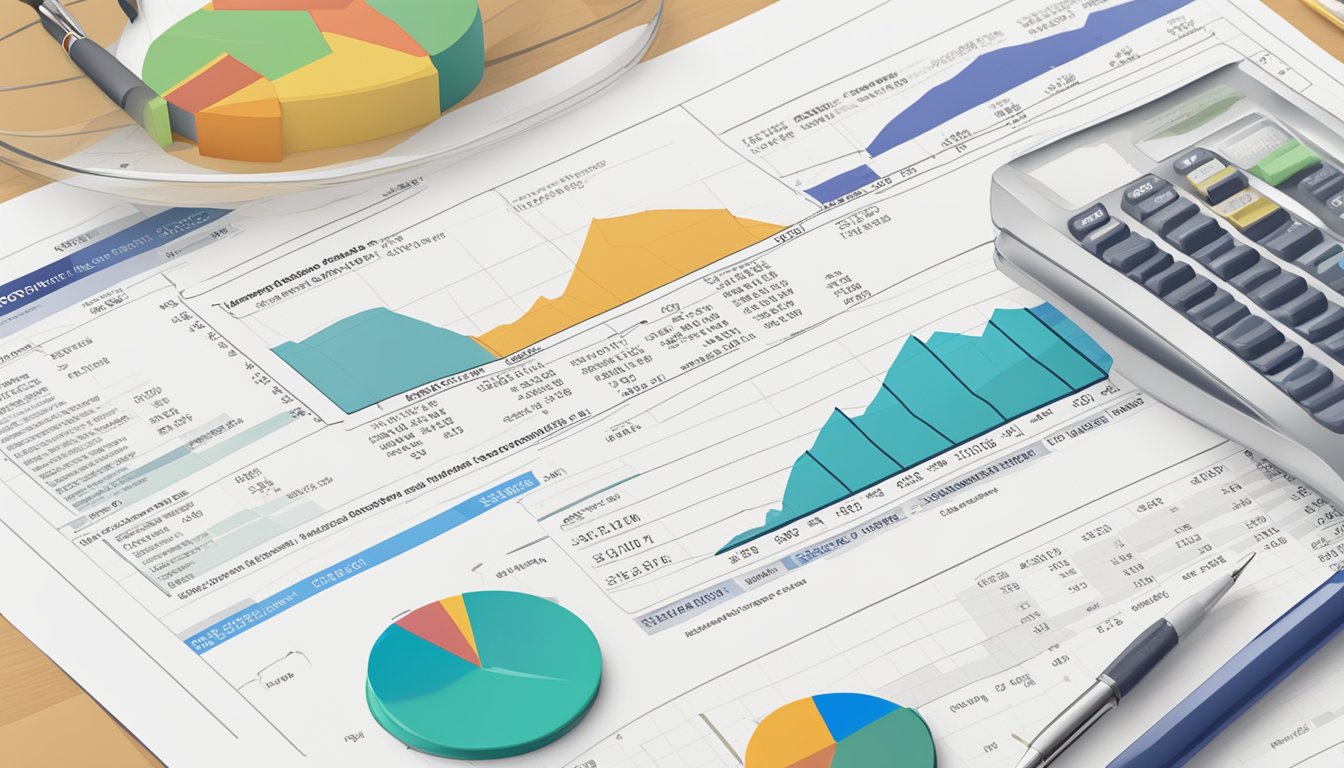Brokerage accounts are a popular way to invest in the stock market, and Singapore is no exception. If you’re looking to invest in Singapore or overseas stocks, you’ll need a brokerage account to get started. With so many different brokerage accounts available, it can be challenging to know which one to choose. Understanding the basics of brokerage accounts in Singapore can help you make an informed decision and start investing in the market.

Setting up a brokerage account in Singapore is a straightforward process, but it requires some preparation. You’ll need to open a Central Depository (CDP) account, which holds your shares in electronic form. You’ll also need to choose a brokerage firm and open an account with them. Once you’ve completed these steps, you’ll be ready to start trading.
Investing in Singapore and beyond is an excellent way to diversify your portfolio and take advantage of market opportunities. With a brokerage account, you can invest in a range of assets, including stocks, bonds, mutual funds, and exchange-traded funds (ETFs). You can also trade in foreign currencies, which can be beneficial if you’re looking to diversify your investments.
Key Takeaways
- Brokerage accounts are necessary for investing in the stock market in Singapore.
- Setting up a brokerage account requires opening a CDP account and choosing a brokerage firm.
- With a brokerage account, you can invest in a range of assets and diversify your portfolio.
Understanding Brokerage Accounts in Singapore

If you’re looking to invest in securities in Singapore, you’ll need a brokerage account. In this section, we’ll cover what a brokerage account is and the different types of brokerage accounts available in Singapore.
What Is a Brokerage Account?
A brokerage account is an investment account that allows you to buy and sell securities such as stocks, bonds, and mutual funds. When you open a brokerage account, you’ll be provided with a trading platform that allows you to place orders for buying and selling securities.
In Singapore, there are two types of brokerage accounts: cash accounts and margin accounts. A cash account requires you to have sufficient funds in your account before you can place an order. A margin account allows you to borrow money from your broker to buy securities, but it also comes with higher risks.
Types of Brokerage Accounts
In Singapore, there are two types of accounts you’ll need to open before you can start trading: a Central Depository (CDP) account and a brokerage account.
A CDP account is a custodian account that holds the securities you buy from the Singapore Exchange (SGX). When you buy a security, it will be credited to your CDP account, and when you sell a security, it will be debited from your CDP account. You’ll need to open a CDP account before you can open a brokerage account.
A brokerage account is where you’ll place your orders to buy and sell securities. There are many brokerage firms in Singapore, and each has its own trading platform and fee structure. When choosing a brokerage firm, consider factors such as fees, trading platform, customer service, and the range of securities available.
Overall, opening a brokerage account in Singapore is a straightforward process, but it’s important to understand the different types of accounts and the risks involved in trading securities. With a little research and the right brokerage account, you can start investing in Singapore’s vibrant securities market.
Setting Up Your Trading Account

Opening a brokerage account in Singapore is a straightforward process that can be completed in a few steps. In this section, we will guide you through the process of setting up your trading account.
Opening a Brokerage Account
The first step in setting up your trading account is to open a brokerage account. There are several brokerage firms in Singapore that you can choose from, and each has its own set of requirements and fees. It is important to do your research and choose a brokerage firm that suits your needs.
Once you have chosen a brokerage firm, you will need to provide some personal information, such as your name, address, and identification documents. You may also need to provide proof of your income and residency.
CDP-Linked Account vs Custodian Account
When opening a brokerage account in Singapore, you have the option of choosing between a CDP-linked account and a custodian account. A CDP-linked account is linked to your Central Depository (CDP) account, which is required for trading in Singapore. A custodian account, on the other hand, is held by the brokerage firm on your behalf.
A CDP-linked account is generally preferred as it allows you to have direct control over your investments. It also offers lower fees compared to a custodian account. However, not all brokerage firms offer CDP-linked accounts, so it is important to check with your chosen firm.
Eligibility
To be eligible to open a trading account in Singapore, you must be at least 18 years old and have a bank account with one of the following banks in Singapore: Citibank, DBS/POSB, HSBC, Maybank, OCBC, Standard Chartered Bank, or UOB. You will also need to provide a One-Time Pin (OTP) for verification purposes.
In addition, you will need to meet the minimum investment amount required by your chosen brokerage firm. This amount varies between firms, so it is important to check before opening an account.
In conclusion, setting up a trading account in Singapore is a simple process that can be completed in a few steps. By following the guidelines provided by your chosen brokerage firm, you can start investing in the Singapore stock market and grow your wealth.
Investing in Singapore and Beyond

When it comes to investing in Singapore, there are a variety of options available to you. Whether you’re interested in stocks, ETFs, bonds, or other investment vehicles, you’ll find plenty of opportunities to grow your wealth.
Singapore Stock Exchange
One of the most popular ways to invest in Singapore is through the Singapore Stock Exchange (SGX). With over 700 listed companies, the SGX offers a wide range of investment opportunities for both local and international investors. Some of the most popular stocks on the SGX include DBS Group Holdings, Singapore Telecommunications, and United Overseas Bank.
In addition to traditional stocks, the SGX also offers a range of exchange-traded funds (ETFs) that allow investors to gain exposure to a diverse range of assets, including commodities, currencies, and global equities.
Global Markets
Of course, investing in Singapore is just the beginning. If you’re looking to diversify your portfolio and gain exposure to global markets, there are plenty of opportunities available to you.
One popular option is to invest in the US market. With a market capitalisation of over $30 trillion, the US market is the largest in the world and offers a wide range of investment opportunities across a variety of sectors. Some of the most popular stocks on the US market include Apple, Amazon, and Microsoft.
Another option is to invest in the Hong Kong market. As one of the world’s leading financial centres, Hong Kong offers a range of investment opportunities across a variety of sectors, including finance, technology, and real estate. Some of the most popular stocks on the Hong Kong market include Tencent Holdings, China Mobile, and HSBC Holdings.
Finally, if you’re looking to gain exposure to overseas markets, there are a variety of options available to you. Whether you’re interested in emerging markets like China and India or developed markets like Europe and Japan, there are plenty of investment opportunities available to help you grow your wealth.
In conclusion, whether you’re interested in investing in Singapore or beyond, there are plenty of opportunities available to help you achieve your financial goals. By diversifying your portfolio and taking advantage of the many investment options available to you, you can build a strong and sustainable financial future.
Fees and Charges

When it comes to brokerage accounts in Singapore, it’s essential to understand the fees and charges associated with them. In this section, we’ll cover the various fees and costs that you should be aware of before opening a brokerage account.
Understanding Trading Fees
Trading fees are one of the most significant costs associated with brokerage accounts. These fees are charged every time you buy or sell a security. In Singapore, trading fees typically include a commission fee and a platform fee.
The commission fee is a percentage of the transaction value, and it varies depending on the brokerage firm. Some firms offer low commission rates, while others charge higher fees. It’s important to compare the commission rates of different firms before choosing one.
The platform fee is another cost associated with trading. This fee is charged by the brokerage firm for the use of their trading platform. Some firms may offer a free platform, while others may charge a monthly fee.
Other Associated Costs
Apart from trading fees, there are other costs associated with brokerage accounts. These costs may include clearing fees, minimum commission fees, and other charges.
Clearing fees are charged by the Central Depository (CDP) for the clearing and settlement of securities transactions. The clearing fee is usually a fixed amount per trade.
Minimum commission fees are the minimum amount that a brokerage firm charges for a trade. This fee may be charged if the commission fee calculated as a percentage of the transaction value is lower than the minimum commission fee.
Other charges may include custody charges, corporate action charges, and debit balance interest. It’s important to read the terms and conditions of the brokerage account carefully to understand all the associated costs.
In conclusion, before opening a brokerage account in Singapore, it’s essential to understand the fees and charges associated with it. By doing so, you can make an informed decision and choose a brokerage account that suits your needs and budget.
Choosing the Right Trading Platform

If you’re new to investing, choosing the right trading platform can be daunting. With so many online brokerages to choose from, it’s important to consider what features are most important to you.
Features to Consider
When comparing trading platforms, there are several features to consider. Here are a few to keep in mind:
-
Fees: Look for a trading platform with low fees. Some brokerages charge a commission per trade, while others charge a flat fee per month. Make sure you understand the fee structure before opening an account.
-
Investment Options: Consider what types of investments you want to make. Do you want to invest in stocks, bonds, or mutual funds? Look for a platform that offers the types of investments you’re interested in.
-
Mobile App: If you’re always on the go, consider a trading platform with a mobile app. This will allow you to monitor your investments and make trades from anywhere.
-
Dashboard: Look for a platform with a user-friendly dashboard. This will make it easier to track your investments and monitor your portfolio.
-
Customer Account Review: Consider a platform with a customer account review feature. This will allow you to see how your investments are performing and make adjustments as needed.
Comparing Top Brokerages
Here are a few of the top online brokerages in Singapore to consider:
-
Interactive Brokers: Offers low fees and a wide range of investment options.
-
Saxo Markets: Offers a user-friendly dashboard and a wide range of investment options.
-
Tiger Brokers: Offers a mobile app and low fees.
-
Moomoo: Offers low fees and a wide range of investment options.
-
FSMOne: Offers a CDP-linked account and RSP of SG stocks.
-
CGSCIMB Securities: Offers a wide range of investment options and a user-friendly dashboard.
-
KGi Securities: Offers low fees and a wide range of investment options.
-
OCBC Securities: Offers a wide range of investment options and a user-friendly dashboard.
-
Phillip Securities: Offers low fees and a wide range of investment options.
-
Standard Chartered: Offers a wide range of investment options and a user-friendly dashboard.
-
UOB Kay Hian: Offers low fees and a wide range of investment options.
Make sure to do your research and choose the brokerage that best fits your investment goals and financial situation. With the right trading platform, you can start investing in the financial markets and grow your wealth.
Frequently Asked Questions

What’s the most thrilling trading platform for a novice in Singapore?
If you’re a novice trader looking for a thrilling trading platform in Singapore, there are several options available to you. Some of the most popular platforms include Saxo Markets, Interactive Brokers, and CMC Markets. Each platform offers a range of features and benefits, so it’s important to do your research and choose the one that best suits your needs.
Which brokers offer the most exhilarating zero-fee trading experience in Singapore?
Several brokers in Singapore offer zero-fee trading experiences, including Tiger Brokers, FSMOne, and Interactive Brokers. These brokers provide a range of investment options and tools to help you make informed investment decisions.
How can I identify the most sensational brokerage for US stock trading in Singapore?
To identify the most sensational brokerage for US stock trading in Singapore, consider factors such as commission fees, trading platform features, and customer support. Some of the top contenders in this category include Saxo Markets, Interactive Brokers, and TD Ameritrade.
Could you tell me the process for opening an electrifying investment account in Singapore?
To open an electrifying investment account in Singapore, you will need to choose a brokerage firm and complete the account opening process. This typically involves providing personal and financial information, as well as completing any necessary paperwork. Some popular brokerage firms in Singapore include DBS Vickers, Phillip Securities, and UOB Kay Hian.
What are the top contenders for the title of most dynamic stock broker in Singapore?
Some of the top contenders for the title of most dynamic stock broker in Singapore include Saxo Markets, Interactive Brokers, and CMC Markets. These brokers offer a range of investment options and tools to help you make informed investment decisions.
Is owning a vibrant brokerage account in Singapore truly beneficial for my financial portfolio?
Owning a vibrant brokerage account in Singapore can be highly beneficial for your financial portfolio. By investing in a range of assets, you can diversify your portfolio and potentially increase your returns over time. Additionally, many brokerage firms in Singapore offer a range of investment tools and resources to help you make informed investment decisions.




